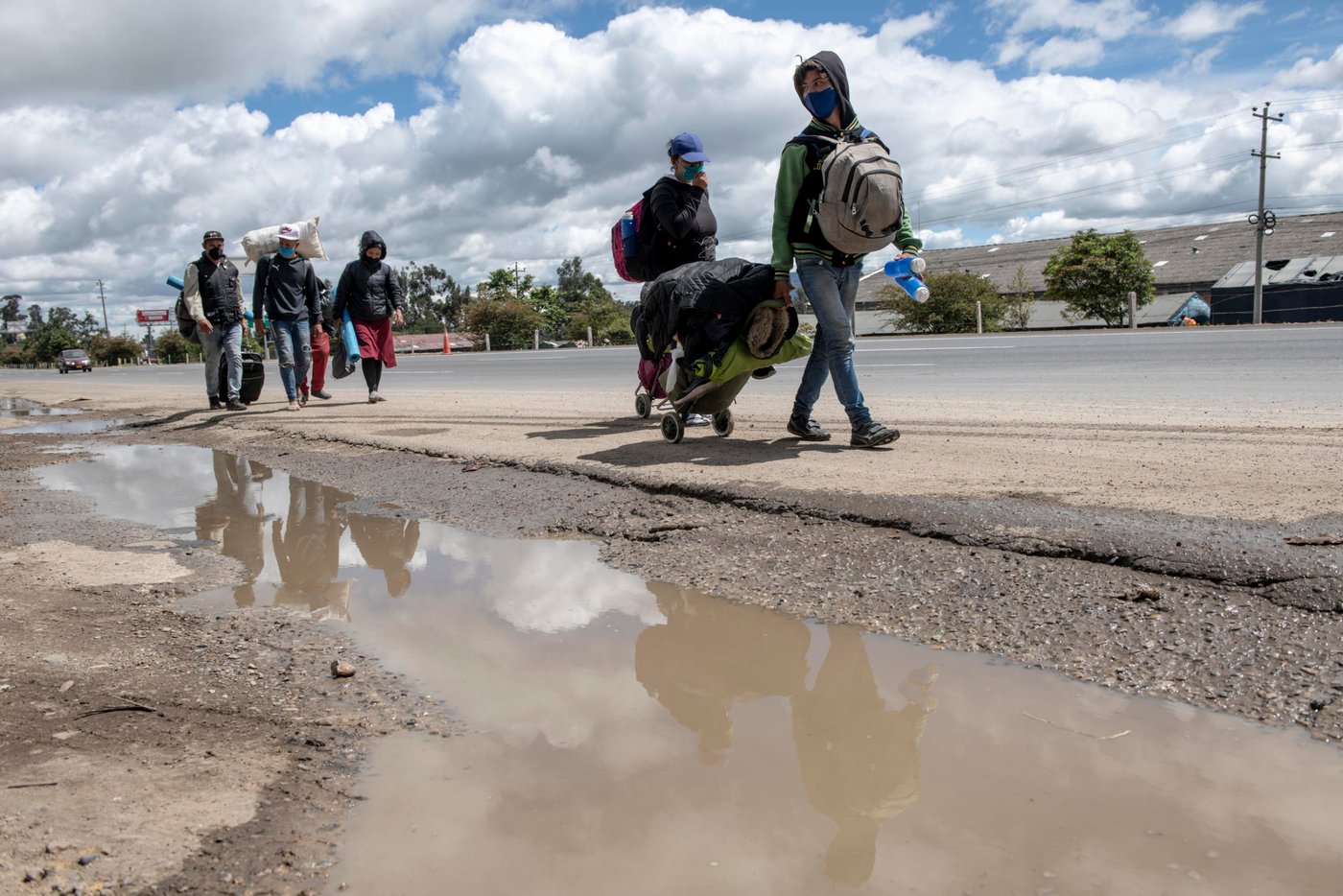A group of Venezuelans is walking along the highway a few kilometres outside Bogotá. They are coming from Lima in Peru, where they left a month ago, and heading to the city of Valencia in the north of Venezuela.
They start walking at 6 am each morning and stop around 5 pm. For the last few days, they have only managed to travel 10 km a day because one of the women is pregnant. They wash themselves in the rivers they find along the way, or at petrol stations.
The UN estimates that more than five million refugees and migrants have left Venezuela for other countries in Latin America and the Caribbean in recent years. However, the Covid-19 pandemic is now forcing tens of thousands to return home, as lockdown measures prevent them from earning a living.

Travelling on foot
On the highway we meet with Bregorio Rodriguez, 27, his girlfriend Mariannis Barco, 19, their 18-month-old baby, Gabriela, and Bregorio’s brother, Eduar, 21. They are travelling on foot, carrying all their belongings in two baby wagons.
They started their journey two days ago. They had been living in Soacha, a working-class town to the south of Bogotá, but had to leave when they were evicted from their house.

Their livelihoods have dried up
“The biggest factor that makes Venezuelan refugees particularly vulnerable is that they often do not have regular legal status in their host countries. This means that they have limited access to formal employment, reliable shelter, or public health services,” says Nayibe Pérez, rapid response unit project manager with the Norwegian Refugee Council (NRC) in Colombia.
In the face of such adverse conditions, some Venezuelans have decided to return home as their livelihoods have dried up abroad. As of 30 June 2020, more than 80,000 had returned from different parts of Latin America.

Protecting the vulnerable
Maria Duque, wearing a black and orange NRC vest, is leading some children in a group activity. Some parents are standing by, watching.
Maria and her team are holding workshops and various activities. The workshops focus on migration issues and on risks such as forced recruitment, child labour and sexual abuse. The team uses a method based on “body movement strategy” to help the children become more aware of their bodies.

In addition, NRC is providing food, water and hygiene equipment, as well as puzzles, school supplies and some clothes for the children to protect them from cold.
The team is also helping the travellers with legal assistance and information about Covid-19, and explaining about the risks that they might find on road.

“I would like to take a hot shower”
Maria sits down with a teenage girl in a pink sweater.
“My name is Darianny,” says the girl.
“How long have you been travelling?” we ask.
“I’m travelling with my mum and my dog Sachita. We left Peru on foot a month ago. We are heading towards our home country Venezuela, and I am glad that we are getting closer to our destination.”
The 13-year-old is happy to receive some clothes and hygiene items.
“I have not changed my clothes for days, and I would like to take a hot shower. But most of all I am looking forward to seeing my grandmother. I miss her so much. I have not seen her in two years.”

A new backpack
Hector Castillo, 23, has just received a new backpack from NRC, to help him travel more comfortably. He is originally from the Venezuelan capital Caracas, but has been living in Colombia for the last 18 months.
“We are not promoting the return of migrants and refugees, but we are bringing dignity and humanity to the people we meet on the road”, Duque explains.
Hector has been walking all day together with two friends. They hope to reach the city of Paipa, 200 kilometres from Bogota, where an aunt of one of his friends will give them shelter for a while.
“The only thing we can do is to walk,” he explains.

Four months pregnant
Yormayra Castillo, 21, is travelling with five other adults, plus her son and four other children. One of her companions has walked from Rumichaca on the border between Colombia and Peru. The others have walked from Peru.
Yormayra is four months pregnant and all the walking makes her very tired, but she is thankful for the assistance NRC is offering. The group has received new backpacks and hygiene kits among other things.

We do not ask for anything
Jackson Antonio Ramirez Ruiz, 36, has just arrived at a bus station on the highway, where NRC is providing walkers with backpacks, shoes, socks and hygiene items.
Jackson has travelled from Lima in Peru over the last three weeks. He lived for two and a half years in Peru, where he worked in a kitchen. When the restaurant closed, he lost his income and had to leave, like many other Venezuelans.
“Sometimes, on the way, people give us food. But because we are ashamed, we do not ask for anything. We weren't taught to ask for money,” he says.


